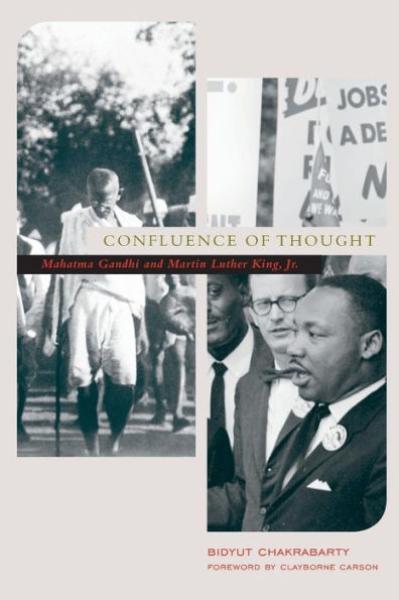Description
Gandhi and King were perhaps the most influential individuals in modern history to combine religious and political thought into successful and dynamic social ideologies. Gandhi emphasized service to humanity while King, who was greatly influenced by Gandhi, pursued religion-driven social action. Chakrabarty looks particularly at the way in which each strategically used religious and political language to build momentum and attract followers to their movements. The result is a compelling and historically entrenched view of two of the most important figures of the twentieth century and a thoughtful meditation on the common threads that flow through the larger and enduring nonviolence movement.
"The literature on Gandhi and Martin Luther King is vast, and scholars often speak of the two leaders when discussing theories of non-violence. Yet, no attempt has yet been made to understand the way in which Gandhi and King's socio-political ideas converge in terms of their origins, development and application. In Confluence of Thought, Bidyut Chakrabarty argues that there is a confluence of thought between Gandhi and King's concerns for humanity and advocacy of non-violence, despite their different historical and socio-economic contexts. He says that these two figures are perhaps the best modern historical examples of individuals who combined religion with the political to produce a dynamic social ideology. Gandhi saw service to humanity as the path to 'self-actualization' and thus spiritually most fulfilling; similarly, King pursued religion-driven social action. Chakrabarty looks particularly at the way in which each deployed religious and political language to draw the widest possible membership to their social movements. While Chakrabarty points out that neither thinker was able to fulfill his chosen mission, both suffering death by assassination, he positions the two as the premier modern influences on theories of non-violence today"--
"Bidyut Chakrabarty has written one of those unusual books that actually delivers more to readers than is suggested by the title. ...This book provides an engaging, thought-provoking, well-researched examination of the lives and times of two of the most influential figures of the twentieth century." -Clayborne Carson
"In this impressively researched and clearly written work, Bidyut Chakrabarty weaves together political theory, political sociology, and biography to demonstrate the close similarities and critical differences between Gandhi and King. With fresh perspectives, this impressive study broadens our understanding of these preeminent thinkers and activists of nonviolent resistance to injustice."-Ronald J. Terchek, Professor Emeritus, University of Maryland
"...a fine, creative and informative volume that will be of interest to political scientists and peace studies scholars working in a number of sub-fields."-Political Studies Review
Product Details
- Oxford University Press, Brand
- Aug 9, 2013 Pub Date:
- 0199951233 ISBN-10:
- 9780199951239 ISBN-13:
- 288 Pages
- 9.1 in * 6.1 in * 0.9 in Dimensions:
- 1 lb Weight:




